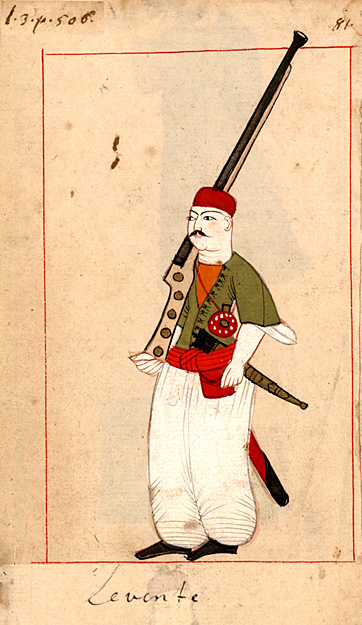Levend on:
[Wikipedia]
[Google]
[Amazon]
 Levend or levendi (
Levend or levendi (
 Levend or levendi (
Levend or levendi (Arabic
Arabic (, , or , ) is a Central Semitic languages, Central Semitic language of the Afroasiatic languages, Afroasiatic language family spoken primarily in the Arab world. The International Organization for Standardization (ISO) assigns lang ...
''lawend'') was a name for irregular soldiers. The term originated with the Ottoman Navy
The Ottoman Navy () or the Imperial Navy (), also known as the Ottoman Fleet, was the naval warfare arm of the Ottoman Empire. It was established after the Ottomans first reached the sea in 1323 by capturing Praenetos (later called Karamürsel ...
, but eventually spread to encompass most irregular troops.
The origin of the term is probably from Italian ''levanti'', and was used by the Venetians for the various local troops they raised in the coasts of the Balkans
The Balkans ( , ), corresponding partially with the Balkan Peninsula, is a geographical area in southeastern Europe with various geographical and historical definitions. The region takes its name from the Balkan Mountains that stretch throug ...
, i.e. Christian Greeks, Albanians, and Dalmatians, to serve in the Venetian navy
The Venetian navy () was the navy of the Venetian Republic which played an important role in the history of the republic and the Mediterranean world. It was the premier navy in the Mediterranean Sea for many centuries between the medieval and ea ...
or as auxiliary troops. The Ottomans, who relied on the same manpower pool (eventually along with Muslim Anatolia
Anatolia (), also known as Asia Minor, is a peninsula in West Asia that makes up the majority of the land area of Turkey. It is the westernmost protrusion of Asia and is geographically bounded by the Mediterranean Sea to the south, the Aegean ...
n Turks), borrowed the name. Gradually, as the Ottoman navy became more professional, the undisciplined ''levends'' started to be replaced by regular troops. The name however survived as a generic name for naval troops, particularly the riflemen (''tüfekdji''). Thus the Imperial Arsenal in Constantinople
Constantinople (#Names of Constantinople, see other names) was a historical city located on the Bosporus that served as the capital of the Roman Empire, Roman, Byzantine Empire, Byzantine, Latin Empire, Latin, and Ottoman Empire, Ottoman empire ...
contained two barracks for ''levends''.
Thus in the 17th and 18th centuries, ''levend'' came to refer to irregular mercenaries, mostly infantry but also cavalry, used alongside other terms. Like the mercenaries and condottieri of Western Europe, the ''levend'' formed true "free companies"; their employer was either the Ottoman central government, which was increasingly pressed for fresh troops to match the growing strength of its various neighbours, and to offset the decline of its once-formidable '' kapikulu'' soldiery, or various provincial magnates and governors. A notable aspect of Ottoman mercenaries is that they served away from their home region; thus Albanians
The Albanians are an ethnic group native to the Balkan Peninsula who share a common Albanian ancestry, Albanian culture, culture, Albanian history, history and Albanian language, language. They are the main ethnic group of Albania and Kosovo, ...
served in the Middle East
The Middle East (term originally coined in English language) is a geopolitical region encompassing the Arabian Peninsula, the Levant, Turkey, Egypt, Iran, and Iraq.
The term came into widespread usage by the United Kingdom and western Eur ...
, and Anatolian Turks in Europe or North Africa.
When without employment, however, the ''levends'' often turned to brigandage, and the term quickly came to denote any "vagabond and rascal". At the turn of the 18th century, the Ottoman authorities tried to counter the activities of roving ''levend'' bands by offering them employment in the new military corps of '' deli'' and '' gönüllü''. Later, repeated expeditions were waged against them in Anatolia in 1737, 1747, 1752, 1759, and 1763. Even when they formed part of a governor's retinue, however, they had a reputation for criminal behaviour and licentiousness, as records from the Ottoman provinces and the tales of Western travellers show.
References
Sources
* * * {{cite book, last1=Uyar, first1=Mesut, last2=Erickson, first2=Edward J., title=A Military History of the Ottomans: From Osman to Atatürk, url=https://books.google.com/books?id=JgfNBKHG7S8C&pg=PA63, year=2009, publisher=ABC-CLIO, isbn=978-0-275-98876-0 Ottoman Navy Military units and formations of the Ottoman Empire Irregular units and formations Auxiliary units and formations Mercenary units and formations of the early modern period